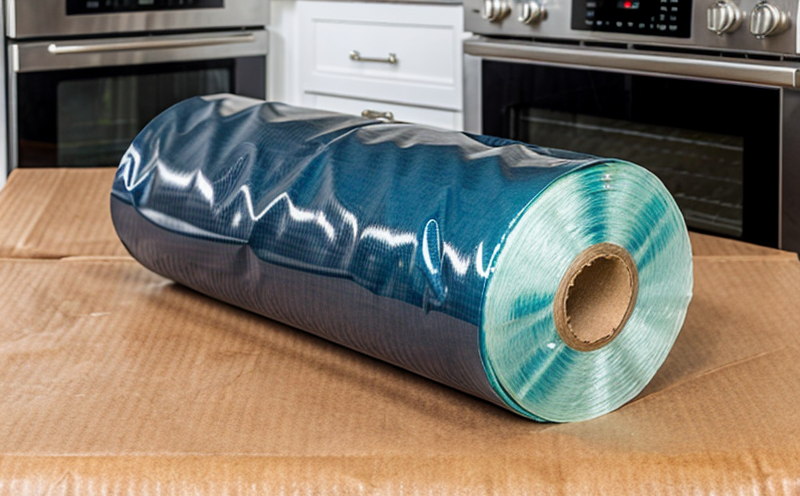JIS K 7191 Flexural Testing of Plastic Household Covers
The JIS K 7191 flexural test is a critical procedure for assessing the mechanical properties of plastic household covers. This standard plays a pivotal role in ensuring product quality, safety, and durability. The test measures how materials perform under bending stress, which helps identify their suitability for use as household wraps or covers.
Household wraps and covers are essential items that protect food and other household goods from contamination and spoilage. These products undergo rigorous testing to ensure they meet the required standards in terms of strength, flexibility, and resistance to environmental factors such as moisture and temperature fluctuations. The JIS K 7191 test is particularly important for evaluating the flexural properties of these materials.
The procedure involves bending a specimen to a specified angle under controlled conditions, typically using a four-point bend setup. The goal is to determine the maximum stress before fracture or permanent deformation occurs. This information is crucial in optimizing material selection and manufacturing processes, ensuring that products perform reliably under real-world usage scenarios.
For accurate testing, specimens must be prepared according to strict guidelines provided by JIS K 7191. Factors such as specimen dimensions, temperature conditions during testing, and the application of load are critical for obtaining reliable results. Proper calibration of test equipment is also essential to ensure consistent and repeatable outcomes.
The standard specifies detailed acceptance criteria based on the flexural properties of the material. These criteria help manufacturers and quality control teams assess whether a product meets the required standards. Compliance with JIS K 7191 ensures that household wraps and covers are safe, durable, and effective in their intended applications.
| Parameter | Description |
|---|---|
| Specimen Dimensions | Length: 150 mm; Width: 25 mm; Thickness: 3 mm |
| Test Temperature | 23°C ± 2°C |
| Load Application Rate | 5 mm/min |
| Specimen Support Spacing | 100 mm |
| Load Range | 2.5 kN to 30 kN (depending on specimen size) |
The test results provide valuable data that can be used for product improvement and quality assurance. By adhering to JIS K 7191, manufacturers can ensure their products meet international standards of excellence.
In summary, the JIS K 7191 flexural testing is a vital process in the development and quality control of plastic household wraps and covers. It ensures that these products are robust enough to withstand typical environmental stresses while maintaining optimal performance for end users.
Eurolab Advantages
EuroLab offers comprehensive support and expertise in JIS K 7191 flexural testing of plastic household covers. Our team of experienced professionals ensures that all tests are conducted according to the latest standards and best practices.
- Accurate Calibration: Our instruments are regularly calibrated to guarantee precise measurements.
- Comprehensive Knowledge: Our staff is well-versed in JIS K 7191 guidelines, ensuring accurate interpretation of results.
- Detailed Reporting: We provide detailed reports that include all relevant parameters and interpretations.
- State-of-the-Art Equipment: EuroLab utilizes the latest technology to perform tests with high accuracy and precision.
EuroLab's commitment to quality and excellence is reflected in every test we conduct. Our services are designed to meet the needs of various stakeholders, including quality managers, compliance officers, R&D engineers, and procurement teams. By partnering with EuroLab, you can be assured of reliable and accurate testing that meets international standards.
Why Choose This Test
- Compliance: Ensures compliance with JIS K 7191 standards for plastic household covers.
- Quality Assurance: Provides data to support quality assurance and product improvement initiatives.
- R&D Support: Offers insights into material performance that can drive innovation in design and manufacturing processes.
- Supplier Evaluation: Helps procurement teams evaluate the reliability of suppliers by assessing their products against JIS K 7191 standards.
The JIS K 7191 flexural test is an essential tool for manufacturers, quality control professionals, and R&D engineers working with plastic household covers. By choosing this test, you can ensure that your products meet the highest international standards and are reliable in real-world conditions.
Use Cases and Application Examples
The JIS K 7191 flexural test is widely used across various industries where plastic household covers play a crucial role. Here are some practical applications:
| Industry | Application |
|---|---|
| Food Packaging | Evaluating the integrity and strength of packaging materials to prevent contamination. |
| Horticulture | Assessing the durability of covers used in greenhouse applications to protect plants from adverse weather conditions. |
| Home Appliances | Testing the robustness of covers used in kitchen appliances like ovens and microwaves. |
In each of these industries, the flexural test provides critical information that informs product design, manufacturing processes, and quality control measures. By understanding how materials perform under bending stress, manufacturers can make informed decisions to enhance product performance and safety.





